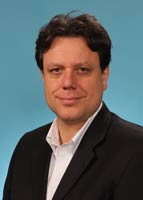Camillo Padoa-Schioppa, PhD

Camillo Padoa-Schioppa, PhD, assistant professor of neurobiology, of economics and of biomedical engineering, is recognized for his fundamental discoveries in the neural bases of decision making.
Considered an international leader in the field of neuroeconomics, Padoa-Schioppa studies how humans and non-human primates make choices based on subjective values. Much of his work focuses on the orbitofrontal cortex of the brain. In their experiments, he and colleagues offer non-human primates a choice between two drinks, then record the activity of individual neurons as the animals choose.
In 2006, Padoa-Schioppa and Harvard colleague John Assad, PhD, won international attention for using this approach to identify brain cells whose firing rates encoded the subjective value of offered and chosen goods. More recently, Padoa-Schioppa found that difficult, toss-up decisions partly depend on the initial state of the neuronal network and on how well neurons communicate with each other. He and his colleagues are now working on a computational model of decision making.
His work holds implications for development of better economic theory and for understanding impaired decision making in a number of medical conditions, including drug addition, brain injury and some forms of mental illness.
Padoa-Schioppa received his master’s degree in statistical physics in 1996 from the Universita’ La Sapienza in Rome, and his doctoral degree in brain and cognitive sciences in 2002 from the Massachusetts Institute of Technology. After a research fellowship at Harvard Medical School, he joined the faculty at Washington University in 2008, where he serves as an active member of several graduate studies committees. He received the Society for Neuroeconomics Young Investigator Award in 2011.




